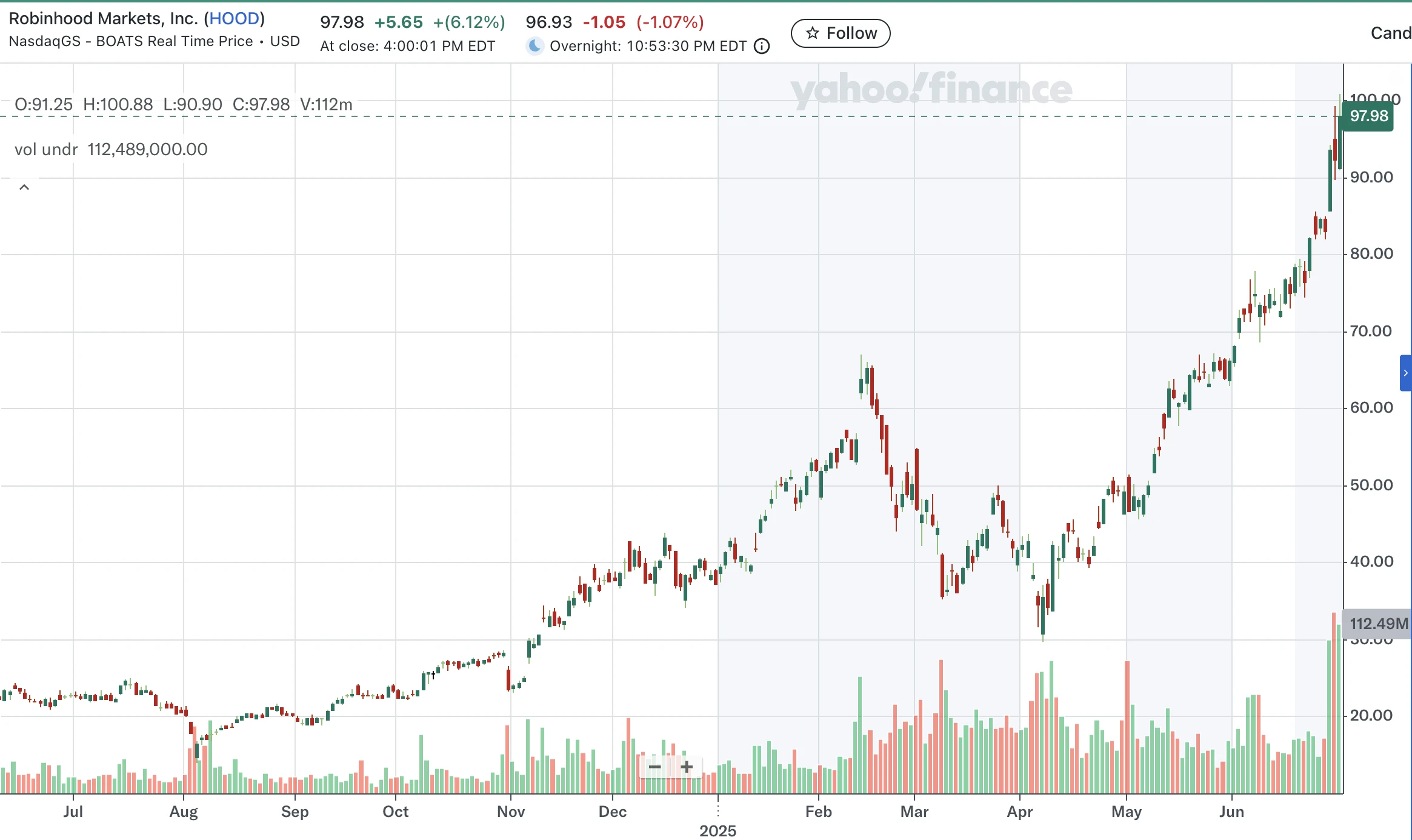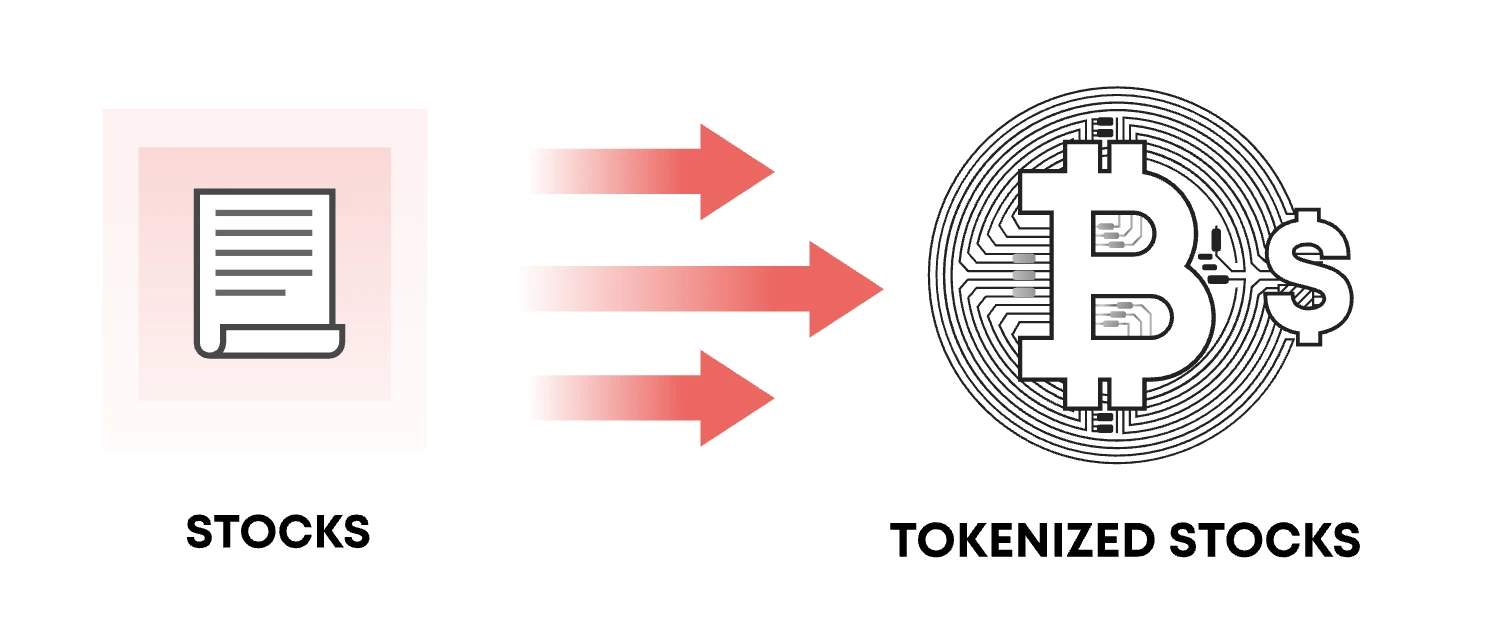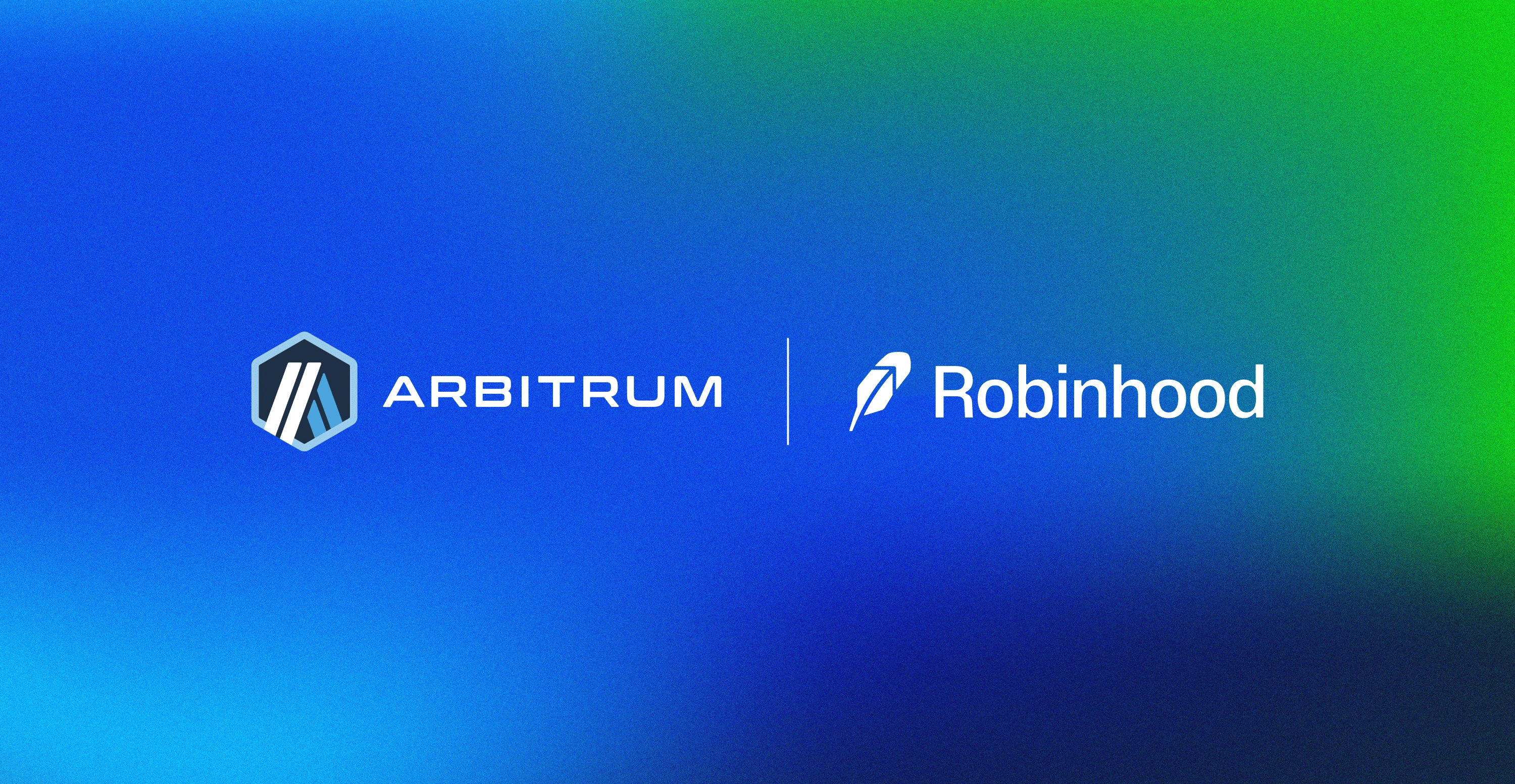On June 30, 2025, Robinhood announced a groundbreaking initiative at the "To Catch a Token" event in Cannes, France: the launch of tokenized trading services for over 200 U.S. stocks and ETFs for EU users, and for the first time, the inclusion of private equity from unlisted companies such as OpenAI and SpaceX into the realm of tokenization. This news hit like a bombshell, quickly driving Robinhood's stock price up nearly 13%, reaching an all-time high, and igniting a heated global discussion on stock tokenization.

As a platform that disrupts traditional brokers with zero-commission trading, Robinhood is further breaking financial barriers through blockchain technology, deeply integrating the traditional stock market with the potential of decentralized finance (DeFi). This not only marks a new round of collision between traditional finance (TradFi) and blockchain technology but also paints a picture of a democratized financial future for global investors.
Stock Tokenization: The Blockchain Rebirth of Traditional Finance
Stock tokenization is the process of converting traditional stocks or equity into digital tokens on the blockchain, with each token representing a certain proportion of ownership of the underlying asset. These tokens are issued and traded on the blockchain through smart contracts, retaining the economic attributes of stocks, such as price fluctuations and dividend income, but typically excluding shareholder voting rights.

Compared to the traditional stock market, tokenization utilizes blockchain's distributed ledger technology to achieve transaction transparency and immutability, while significantly reducing intermediary costs and settlement times. Robinhood's tokenization service is based on the Ethereum Layer 2 network Arbitrum, with plans to migrate to its own blockchain platform by the end of 2025 or early 2026. This technological choice not only lowers transaction fees but also allows global investors to participate more easily in the U.S. stock market through its decentralized features. Robinhood's attempt is not an isolated event; globally, stock tokenization is becoming a pioneer in the integration of traditional finance and blockchain, attracting widespread attention from both crypto exchanges and traditional financial institutions.
The services launched by Robinhood cover U.S. market giants such as Apple, Microsoft, and Nvidia, while boldly attempting to tokenize the equity of unlisted companies like OpenAI and SpaceX. This innovation is particularly noteworthy in the EU market, where a relatively relaxed regulatory environment allows non-qualified investors to participate in private equity trading, a feature currently unattainable in the U.S. market due to strict "qualified investor" regulations. However, OpenAI has publicly stated that it does not collaborate with Robinhood and does not endorse its tokenization actions, highlighting the legal and compliance complexities surrounding private equity tokenization. Nevertheless, Robinhood's initiative is still seen as a milestone in the transition of traditional finance to blockchain, signaling that stock tokenization may become a new generation of financial instruments following ETFs.
How Tokenization Reshapes the Investment Experience
The core appeal of stock tokenization lies in its revolutionary change to the investment experience. First, tokenization breaks down the investment barriers of the traditional stock market. By splitting stocks into small tokens, ordinary investors can participate in high-value asset investments at a lower cost. For example, a single share of SpaceX may cost thousands of dollars, far exceeding the budget of average investors, but tokenization allows investors to purchase partial ownership, significantly enhancing market inclusivity. This "partial ownership" model is particularly suitable for young investors and users in emerging markets, as Robinhood's EU users can now invest in U.S. stocks and unlisted companies at a very low cost through its platform.
Additionally, tokenization significantly improves trading efficiency. Traditional stock market transactions typically require multiple intermediaries such as brokers, exchanges, and clearinghouses, with settlement times reaching T+2 (two days after the trading day). In contrast, the instant settlement feature of blockchain reduces transaction times to nearly real-time, and Robinhood's zero-fee model further lowers investment costs. This efficiency not only attracts retail investors but also provides institutional investors with more flexible trading options. More importantly, tokenized stocks support round-the-clock trading, breaking the fixed time constraints of traditional stock markets. Robinhood currently offers 24/5 trading services and plans to achieve 24/7 trading in the future, which is a significant breakthrough for global investment demands.

The transparency and security of blockchain also add unique advantages to tokenization. Distributed ledger technology ensures that every transaction is publicly verifiable, reducing the risk of fraud, while the automated execution of smart contracts minimizes human intervention, further enhancing transaction reliability. Robinhood's tokenized trading through the Arbitrum network not only guarantees technical stability but also provides users with the convenience of direct dividend payments. This transparent and efficient trading model is reshaping investors' trust and participation in financial markets.
Challenges Facing Tokenization
Despite the bright prospects for stock tokenization, its development path is not without obstacles. First, regulatory uncertainty is the biggest barrier. Tokenized stocks are considered securities and must comply with financial regulations in various countries. The EU's MiCA (Markets in Crypto-Assets Regulation) provides a compliance basis for Robinhood's tokenization services, but the U.S. market remains largely closed due to strict SEC regulations. OpenAI's opposition to Robinhood's tokenization further exposes the legal gray areas of private equity tokenization, as unauthorized tokenization could lead to legal disputes and even asset invalidation. In the future, tokenization platforms will need to find a balance between regulatory compliance and innovation, which may increase operational costs and slow market expansion.
Technical risk is another significant challenge. The security and stability of blockchain systems directly affect the reliability of tokenized assets. Historical hacking incidents and smart contract vulnerabilities remind us that technical failures can lead to substantial losses. Robinhood's choice of Arbitrum as the initial issuance network will face complexities in technical integration when migrating to its own blockchain in the future. Additionally, the openness of blockchain conflicts with the privacy protection needs of financial markets. How to ensure transaction transparency while protecting user privacy is a challenge that tokenization platforms must address.

Market acceptance is also a challenge that cannot be ignored. Although tokenized stocks have attracted significant attention, many traditional investors' unfamiliarity and distrust of blockchain technology may hinder its widespread adoption. Tokenized stocks typically do not provide shareholder voting rights, which may reduce their appeal to institutional investors who prioritize corporate governance. Furthermore, the inertia of traditional financial markets leads many investors to prefer familiar brokers and exchanges, meaning tokenization will require time to build broad market trust.
The Future Landscape of Stock Tokenization
The potential of stock tokenization extends far beyond current attempts. According to industry forecasts, by 2030, the market size for tokenized real-world assets (RWA) could reach $16 trillion, with stock tokenization becoming an important component. Robinhood's CEO Vlad Tenev has stated that tokenization will initiate a "massive trading revolution," making financial assets more accessible through blockchain technology. This vision is gradually being realized globally. The Hong Kong Securities and Futures Commission has issued guidelines supporting the tokenization of investment products, and the Taiwan Stock Exchange has established an RWA tokenization task force to explore blockchain applications in stocks and bonds. These policy signals indicate that tokenized stocks will gain legitimacy in more markets.
Industry competition and collaboration further accelerate the development of tokenization. Coinbase is seeking SEC approval to launch tokenized stock services in the U.S., Kraken has launched the xStocks platform through the Solana blockchain, and traditional financial institutions such as JPMorgan and Société Générale are also experimenting with tokenized assets on their own blockchains. These efforts not only promote technological standardization but also facilitate the collaborative development of the blockchain ecosystem. For example, Robinhood's partnership with Arbitrum showcases the potential of cross-chain technology, and future multi-chain integration and interoperability may further enhance the flexibility and coverage of tokenized stocks.
Robinhood's strategic vision is particularly noteworthy. In addition to tokenized stocks, it has also launched cryptocurrency perpetual futures and staking services for Ethereum and Solana, attempting to create a comprehensive investment platform that encompasses both traditional finance and crypto assets. By acquiring Bitstamp for $200 million, Robinhood has further strengthened its crypto trading capabilities. Its developing Layer-2 blockchain will support the tokenization of more real-world assets, including international stocks, private equity, and even bonds. This comprehensive layout gives Robinhood a first-mover advantage in the wave of tokenization.
Robinhood's stock tokenization service marks a new starting point for the integration of traditional finance and blockchain technology. By tokenizing U.S. stocks and unlisted company equity, Robinhood provides EU investors with a low-cost, high-efficiency investment channel while setting a benchmark for the digital transformation of global financial markets. Although challenges related to regulation, technology, and market acceptance remain, tokenized stocks, with their high liquidity, round-the-clock trading, and transparency, are becoming the new favorites of capital markets.
Looking ahead, as blockchain technology matures and regulatory frameworks improve, stock tokenization is expected to break down the barriers of traditional finance, providing global investors with fairer and more transparent investment opportunities. Robinhood's pioneering role and its deep collaboration with the blockchain ecosystem inject strong momentum into this trend. However, OpenAI's opposition reminds us that the challenges of compliance and legality surrounding tokenization cannot be overlooked. In the future, Robinhood and other industry players will need to find a balance between innovation and compliance to achieve the long-term sustainable development of tokenization.
The wave of stock tokenization has already arrived, and Robinhood's attempts are just the beginning. At the intersection of blockchain and traditional finance, a more open and efficient capital market is taking shape. In the next decade, how will tokenization reshape the global financial landscape? The answer may already be emerging in Robinhood's blockchain blueprint.
免责声明:本文章仅代表作者个人观点,不代表本平台的立场和观点。本文章仅供信息分享,不构成对任何人的任何投资建议。用户与作者之间的任何争议,与本平台无关。如网页中刊载的文章或图片涉及侵权,请提供相关的权利证明和身份证明发送邮件到support@aicoin.com,本平台相关工作人员将会进行核查。




